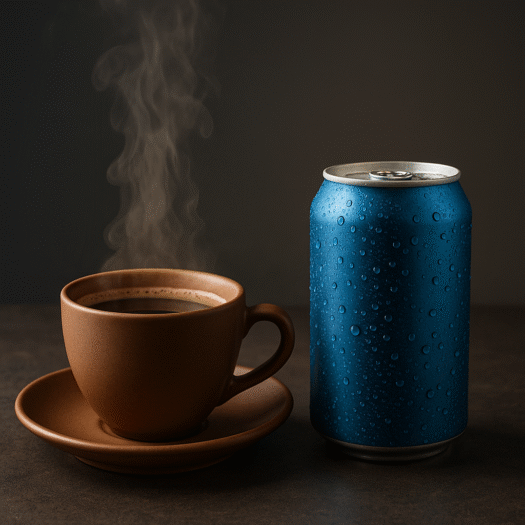Dubai, September 17, 2025 (Qahwa World) – Coffee has long been a global symbol of culture, community, and energy. But new scientific evidence now highlights a profound distinction between the world’s favorite caffeinated beverage and the rising wave of energy drinks. A comprehensive study published in the peer-reviewed journal Nutrients by researchers at the National University of Singapore reveals that coffee consumption may significantly reduce the risk of suicide attempts, while energy drink consumption—even in small quantities—appears to heighten it.
The First Global Meta-Analysis of Its Kind
The research team conducted the first systematic review and meta-analysis that examined the links between caffeine intake, suicide attempts, and suicidal ideation. Reviewing 17 studies across 11 countries, involving more than 1.57 million participants, the study provides one of the clearest pictures yet of how different caffeinated beverages can affect mental health.
The results are striking:
Energy drinks – Just one can per month was associated with a measurable increase in suicidal thoughts and behaviors. The risk escalated linearly with higher consumption, peaking among those consuming 21–30 cans per month, who were nearly three times more likely to attempt suicide compared to non-consumers.
Kahve - Buna karşılık, ayda 60 fincandan fazla kahve içmek intihar riskinde önemli bir azalma ile ilişkilidir. 61-90 fincan arasında kahve tüketenlerin intihar girişiminde bulunma olasılığı %49 daha düşükken, ayda 91-120 fincan kahve içenlerin riski %43 oranında azalmıştır.
Why Energy Drinks Pose Unique Dangers
Araştırmacılar, enerji içeceklerinin zararlı etkisinin kafeinden daha fazlasından kaynaklandığını öne sürmektedir. Bu ürünler tipik olarak kafeini diğer uyarıcılar ve yüksek miktarda şekerle birleştirerek sinir sistemini aşırı yükleyebilecek güçlü bir kokteyl oluşturmaktadır. Çalışma, böyle bir kombinasyonun anksiyeteyi, duygusal dengesizliği ve uyku bozukluğunu tetikleyebileceğini belirtiyor - bunların hepsi intihar düşüncesi için bilinen risk faktörleri.
Adolescents and young adults, who are among the largest consumers of energy drinks, appear especially vulnerable. Previous studies cited in the review have linked energy drink consumption with increased stress, poor academic performance, and risky behaviors. The findings raise urgent public health concerns as energy drinks continue to be aggressively marketed to younger demographics worldwide.
Coffee’s Protective Role and Neurological Pathways
On the other hand, coffee demonstrated a consistent association with lower suicide risk—but only at higher levels of consumption. Scientists point to coffee’s neurochemical effects: caffeine antagonizes adenosine receptors in the brain, boosting the release of neurotransmitters such as dopamine and glutamate. These compounds are closely tied to improved mood, reduced fatigue, and heightened alertness.
Çalışma ayrıca bu bulguları kahve tüketiminin depresyon riskini azalttığını gösteren daha önceki araştırmalarla da ilişkilendiriyor. 2016 yılında yapılan bir meta-analiz, her bir günlük ilave fincan kahvenin depresyon riskinde %8'lik bir düşüşle bağlantılı olduğunu ortaya koyarak kahvenin ruh halini dengeleyici potansiyel rolünü güçlendirmiştir.
Gender and Lifestyle Factors
The Singaporean researchers also explored other variables. Men were found to consume significantly more energy drinks than women, and this gender gap correlated with higher rates of suicidality among male participants. Societal pressures, risk-taking behaviors, and physiological differences may all contribute to this disparity.
In addition, the study observed that individuals consuming high levels of caffeinated beverages often reported concurrent use of alcohol, cigarettes, or other substances. This overlap suggests that caffeine intake may be part of broader lifestyle patterns, complicating the direct attribution of causality.
Implications for Public Health
While the study stops short of claiming a direct cause-and-effect relationship, its findings carry critical implications. With 700,000 people dying by suicide globally each year, and millions more struggling with suicidal thoughts, identifying modifiable lifestyle factors is an urgent priority.
The protective signal associated with coffee suggests that moderate to high consumption could play a role in supporting mental well-being, though more research is needed to establish thresholds and clarify mechanisms. Conversely, the risks tied to energy drinks highlight the need for public health campaigns, regulatory oversight, and targeted interventions—particularly in protecting adolescents from excessive consumption.
A Beverage Divide with Cultural Resonance
Coffee’s story is centuries old, rooted in Yemen’s Sufi traditions before spreading worldwide as a daily ritual of comfort and connection. Energy drinks, by contrast, are a modern creation of aggressive marketing, synthetic additives, and a promise of instant performance. This study places them on opposite sides of the public health debate: one linked with stability and resilience, the other with heightened risk and vulnerability.
Conclusion
The Singapore study underscores that not all caffeine is created equal. Coffee—consumed by billions daily—may serve as more than just a morning pick-me-up. At higher levels of intake, it appears to buffer against some of the darkest mental health outcomes. Energy drinks, however, show the opposite pattern, fueling concern among scientists, educators, and policymakers.
As the global coffee community celebrates the beverage’s cultural and economic significance, this research adds another layer to coffee’s enduring legacy: a potential ally in the fight for mental health.
The post Global Study: Coffee Reduces Suicidal Thoughts While Energy Drinks Double the Risk appeared first on Qahwa World.




